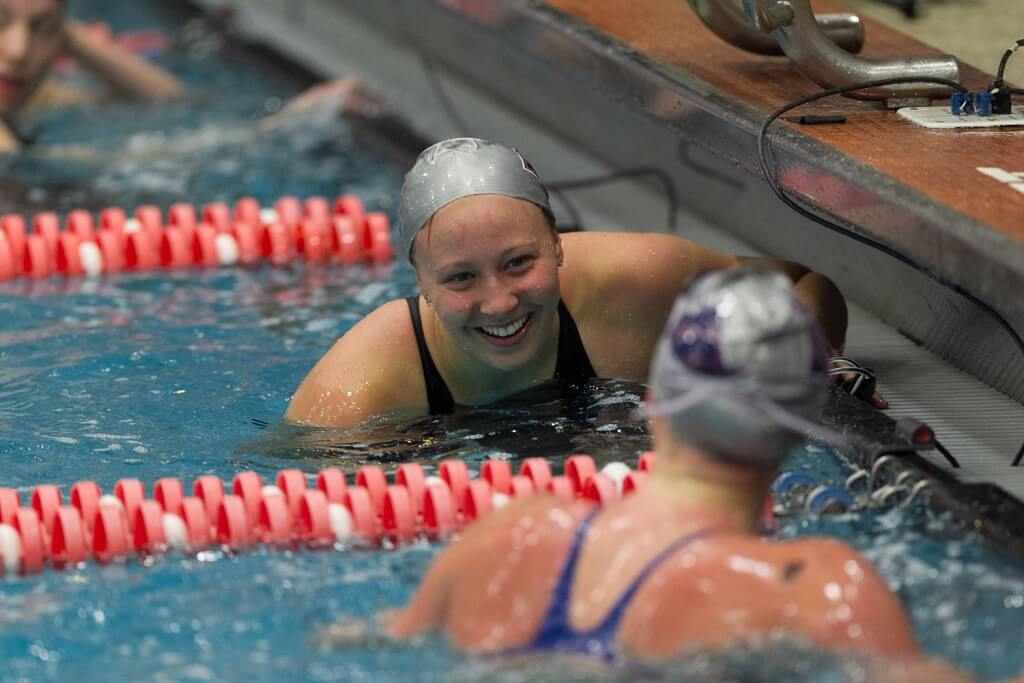The Four S’s of College Swimming: School, Swim, Sleep and Socialization

The Four S’s of College Swimming: School, Swim, Sleep and Socialization
By Annika Hobson, Swimming World College Intern
Swimming in college enhances a student-athlete’s educational experience. Trekking around campus with wet hair, swimmers run all over the place from morning practice at the pool, to classes, to the library, to the pool again for afternoon practice, to weights in the gym, and to the dining halls to fuel whenever they get a chance. On top of that, many swimmers have additional extracurricular activities and/or jobs or internships. Therefore, it can be challenging to fit everything that needs to be done in 24 hours. By the time college swimmers gets back to their dorm rooms, exhaustion hits and their bodies crave sleep. In the world of college swimming, there are four broad categories that make up a day: School, swim, sleep, and socialization.
School

Photo Courtesy: Wikipedia
The most important thing a college swimmer does is learn. College swimmers garner an education in the classroom, but they can also learn many things about themselves, others, and life while in the pool. While swimming is a great addition to the college experience, a swimmer must remember that they are a student-athlete. College swimmers must carve out a large portion of their days for class and homework to ensure they are making the most of their education. Competing in college adds to the college experience in many ways, but one big aspect is that it allows the student-athlete to stay on task and productive by keeping them busy and scheduled. As the saying goes, if you need something done, give it to a busy person and a college swimmer is a great candidate.
Swim
From early morning practices to afternoon practices, college swimmers spend a vast amount of time at the pool. Swimming in college allows athletes to further pursue the sport they love. The variety of colleges and swim teams in NAIA, NCAA Division I, II, and III, and Junior College programs allows many swimmers to find a good fit to continue to pursue their athletic careers while also getting an education. The benefits of joining a swim program include a supportive community, a chance to grow and learn about oneself, an opportunity to practice leadership skills and so much more. For many swimmers, walking onto the pool deck provides an opportunity to decompress from a long day surrounded by teammates doing the sport they love to compete in.
Sleep
Sleep is a particularly important form of recovery for a swimmer’s growing muscles. While in college, it can sometimes be difficult to carve out enough time to get proper sleep to help the body recover. Sometimes it may seem difficult to get the recommended eight hours of sleep a night, but if you make it a priority, your brain and body will thank you. With plenty of sleep, your body rejuvenates and your brain consolidates information; both effects of sleep will make swimmers healthier in and out of the pool.
Socialization
With school, swim and sleep taking up almost all of an athlete’s time, it can be challenging to fit in time to socialize. Luckily, by joining your college’s swim team you have built in friends in your teammates. From rushing over to the dinning hall after a successful practice to rooming at away dual meets, you can create lasting friendships with your fellow swimmers. Some of the best times to socialize are at the walls in between intervals, even though the conversation is split up by swims. Conversing at the walls not only makes practice more fun, but further creates strong teammate bonds. Your teammates can be wonderful friends as they also understand what it means to be a swimmer in college.
A day in the life of a college swimmer can vary, but four commonalities persist: School, swim, sleep, and socialization. By creating a balance between classes, swimming, sleeping, and socializing, a college athlete will have many worthwhile opportunities.
All commentaries are the opinion of the author and do not necessarily reflect the views of Swimming World Magazine nor its staff.



